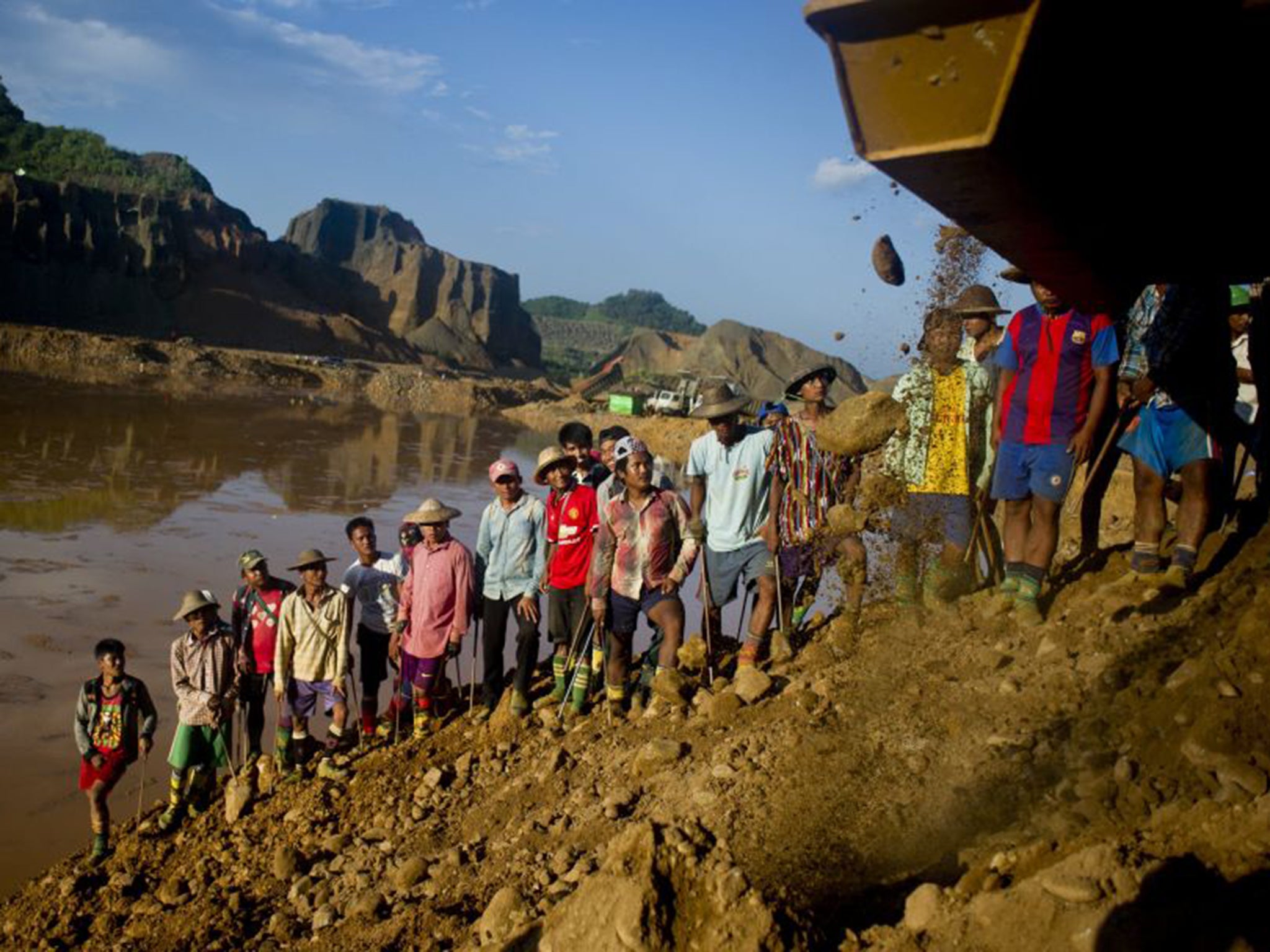Burma: Mining companies putting lives at risk as jade rush continues
Fearing a clampdown on its unregulated industry, mining companies are putting livelihoods at risk

Your support helps us to tell the story
From reproductive rights to climate change to Big Tech, The Independent is on the ground when the story is developing. Whether it's investigating the financials of Elon Musk's pro-Trump PAC or producing our latest documentary, 'The A Word', which shines a light on the American women fighting for reproductive rights, we know how important it is to parse out the facts from the messaging.
At such a critical moment in US history, we need reporters on the ground. Your donation allows us to keep sending journalists to speak to both sides of the story.
The Independent is trusted by Americans across the entire political spectrum. And unlike many other quality news outlets, we choose not to lock Americans out of our reporting and analysis with paywalls. We believe quality journalism should be available to everyone, paid for by those who can afford it.
Your support makes all the difference.It is an event that has become all too familiar in the jade-mining community of Hpakant – the collapse of a heap of slag that engulfed scavengers scrabbling for discarded fragments of the precious stone.
At least six died in the latest tragedy affecting those involved in Burma’s jade rush. Speaking after the collapse on 27 January, Dut La, deacon of the Hpakant Baptist Church, who took charge of the funerals, said: “There are a dozen more possibly buried under the debris but it’s difficult to take the bodies out because it’s dangerous.”
Dangerous is an understatement. Last week’s disaster was the sixth in the man-made canyons around the boom town after a major landslide on 26 November swallowed more than 100 people. In the latest incident, local police reported that about 100 scavengers had installed themselves near a man-made hill 100ft high and 150ft wide and were foraging through it for pieces of jade when the hill collapsed.
The funerals took place at the same time as the biggest shift in Burma’s political status quo since the departure of the British in 1948 was under way in the capital, Naypyidaw. With songs, traditional dances, a banquet and a self-congratulatory speech by outgoing President Thein Sein, the curtain was brought down on the domination of governance by the military that stretches back to the coup d’état of 1962. Tomorrow, when the new parliament takes over and sets about electing a new president, democrats will be in the driving seat. Aung San Suu Kyi is barred by the constitution from becoming president herself, but the person elected to that executive post by MPs is expected to be her proxy, and her National League for Democracy (NLD) will dominate the administration.
In anticipation of a crackdown by the new government, Hpakant’s jade rush has seemingly turned into a frenzy. Days after the November disaster, Suu Kyi told Radio Free Asia: “This sort of accident is common because there is no rule of law. It also reflects lack of due consideration for the safety of people’s lives and property.” Party spokesman Nyan Win said: “We will have to renew the existing regulations and, if necessary, will require the companies to have safe and adequate dump sites when they apply for licences. If existing regulations have this provision, we will have to enforce it.”
Jade is one of Burma’s most prized minerals, and the export trade, particularly to China, goes back centuries. Global Witness, a campaign organisation based in Britain, reported last year that the trade generated earnings of up to $31bn (£22bn) in 2014, which would amount to about half of Burma’s GDP.
There are about 850 mining companies in Hpakant, and since November the big companies with giant trucks and excavators have been roaring through the barren canyons, ripping out the earth and dumping the waste in piles as never before, while hundreds of impoverished scavengers from all over the country claw through the slag heaps.
Khin Maung Myint, the NLD’s newly elected MP for Hpakant, told Myanmar Now, a local news website: “[Mining] companies are getting worried that the new government may restrict the jade mining, so now they are operating round the clock.”
Anarchy on the ground has enabled the companies to maximise their profits, but has created the conditions for one disaster after another, the MP said. “You have rules and regulations to follow when you apply for a jade licence,” he said. “You have to make sure that the work is carried out without causing much damage to the environment. But these rules are not enforced at all on the ground. The companies are dumping waste on the banks of the Uru River. That’s why the river is blocked during the rainy season, and this causes the flooding of riverside vegetable plantations of the local people.
“Now the companies are working around the clock, using heavy vehicles such as dump trucks, backhoes and excavators. They leave behind huge craters, which become lakes during the rainy season. These can be very dangerous because they tend to break open under the pressure of water and cause flash floods.”
What has scared the miners most is the threat that the trade could simply be terminated. Back in December, a former minister, Than Tun Aung, told parliament that in response to the disasters, the government would consider closing some mines. Action by the new government could be far more drastic than that. “If we found that the industry should be shut down,” said Khin Maung Mying, “then we would have to shut it down. As we are selling jade like vegetables. We don’t get a proper price for it.”
Join our commenting forum
Join thought-provoking conversations, follow other Independent readers and see their replies
Comments